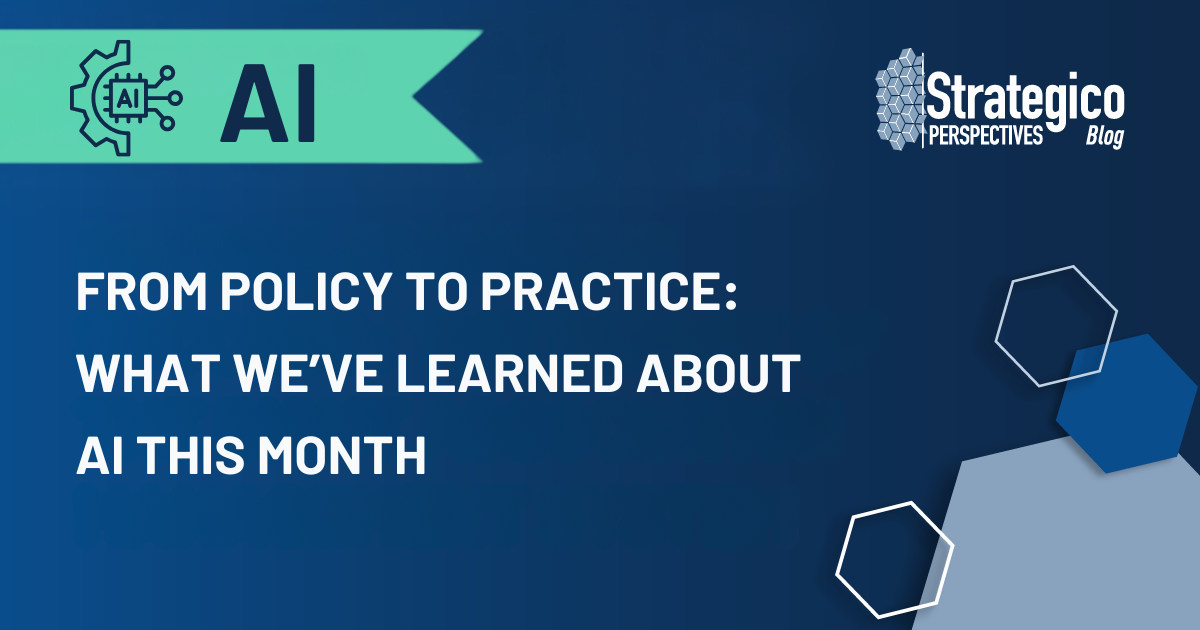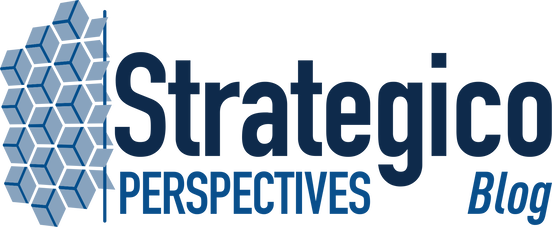From Policy to Practice: What We’ve Learned About AI This Month
8/6/2025

Artificial intelligence has moved beyond buzzword status. For associations, nonprofits, and other mission-driven organizations, AI is quickly becoming a real tool for solving pressing challenges, from streamlining operations to supporting decision-making. But with opportunity comes responsibility: leaders must find the right balance between innovation, trust, and human judgment.
Over the past month, we’ve explored AI from multiple angles: policy, practice, and the day-to-day realities of using it effectively. Here are some of the biggest takeaways.
1. Prompts Aren’t Magic - Conversations Are
The real value comes when organizations treat AI less like a tool spitting out outputs and more like a knowledgeable colleague.
Too much of the AI conversation is still focused on finding the “perfect prompt.” You’ve seen the headlines: 10 prompts to transform fundraising or 5 prompts that will 10x your grant writing. The truth? AI isn’t a vending machine. You don’t drop in the right phrase and get a flawless result.
The organizations seeing real value are treating AI like a colleague. That means:
When you move from one-off prompts to genuine conversations, AI becomes more than a content generator, it becomes a thinking partner.
2. AI Helps with Knowledge and Decision-Making
One of the clearest opportunities for AI lies in how we gather and use knowledge. AI can act as a smart assistant: digging through emails, files, and research to surface the insights we need. But it doesn’t stop there. AI can also analyze complex data to support decision-making, while still leaving the final call in human hands.
This is the sweet spot: using AI to cut through noise so leaders and teams can focus on the human aspects of judgment, creativity, and strategy.
3. Boundaries Matter: Where CEOs Should Draw the Line
As associations explore AI, one critical question keeps rising to the surface: where should leaders draw the line? AI can support operations, draft content, and uncover insights, but it can’t replace human expertise.
In fact, organizations building trust in AI are doing so by empowering their people, not sidelining them. That means:
Sometimes the best question to ask isn’t “ What can AI do?” but “ What’s missing if AI does this instead of a person?” Keeping that lens ensures AI adds value without diminishing the human insight at the heart of mission-driven work.
4. From Policy to Practice: Implementation is Key
The conversations about AI have matured. It’s no longer about “ Should we use AI?” but “ How do we do this well?” This means moving beyond policy statements into everyday practice.
Practical implementation includes:
Success isn’t about racing to adopt every new tool. It’s about thoughtful, mission-aligned steps that empower people and amplify impact.
Final Thought: The Conversation Advantage
What we’ve learned this month is simple but profound: the organizations seeing real AI success aren’t treating it like a replacement or a shortcut. They’re treating it like a collaborator.
By blending smart policy with thoughtful practice, associations and nonprofits can unlock AI’s potential while keeping human judgment and mission at the center.
The real magic isn’t in prompts, or even in the tools themselves. It’s in how we use AI to create time, space, and capacity for the work that matters most.
The real value comes when organizations treat AI less like a tool spitting out outputs and more like a knowledgeable colleague.
Too much of the AI conversation is still focused on finding the “perfect prompt.” You’ve seen the headlines: 10 prompts to transform fundraising or 5 prompts that will 10x your grant writing. The truth? AI isn’t a vending machine. You don’t drop in the right phrase and get a flawless result.
The organizations seeing real value are treating AI like a colleague. That means:
- Providing context: explaining the background, audience, and goals.
- Inviting questions: asking AI what else it needs to know.
- Iterating together: refining drafts the way you would with a human teammate.
When you move from one-off prompts to genuine conversations, AI becomes more than a content generator, it becomes a thinking partner.
2. AI Helps with Knowledge and Decision-Making
One of the clearest opportunities for AI lies in how we gather and use knowledge. AI can act as a smart assistant: digging through emails, files, and research to surface the insights we need. But it doesn’t stop there. AI can also analyze complex data to support decision-making, while still leaving the final call in human hands.
This is the sweet spot: using AI to cut through noise so leaders and teams can focus on the human aspects of judgment, creativity, and strategy.
3. Boundaries Matter: Where CEOs Should Draw the Line
As associations explore AI, one critical question keeps rising to the surface: where should leaders draw the line? AI can support operations, draft content, and uncover insights, but it can’t replace human expertise.
In fact, organizations building trust in AI are doing so by empowering their people, not sidelining them. That means:
- Setting clear boundaries for AI use
- Investing in training to build fluency and comfort
- Emphasizing subject matter expertise as the final filter
Sometimes the best question to ask isn’t “ What can AI do?” but “ What’s missing if AI does this instead of a person?” Keeping that lens ensures AI adds value without diminishing the human insight at the heart of mission-driven work.
4. From Policy to Practice: Implementation is Key
The conversations about AI have matured. It’s no longer about “ Should we use AI?” but “ How do we do this well?” This means moving beyond policy statements into everyday practice.
Practical implementation includes:
- Piloting small projects that show real value
- Engaging staff to build comfort and reduce burnout
- Aligning AI efforts with mission and values
Success isn’t about racing to adopt every new tool. It’s about thoughtful, mission-aligned steps that empower people and amplify impact.
Final Thought: The Conversation Advantage
What we’ve learned this month is simple but profound: the organizations seeing real AI success aren’t treating it like a replacement or a shortcut. They’re treating it like a collaborator.
By blending smart policy with thoughtful practice, associations and nonprofits can unlock AI’s potential while keeping human judgment and mission at the center.
The real magic isn’t in prompts, or even in the tools themselves. It’s in how we use AI to create time, space, and capacity for the work that matters most.


 RSS Feed
RSS Feed